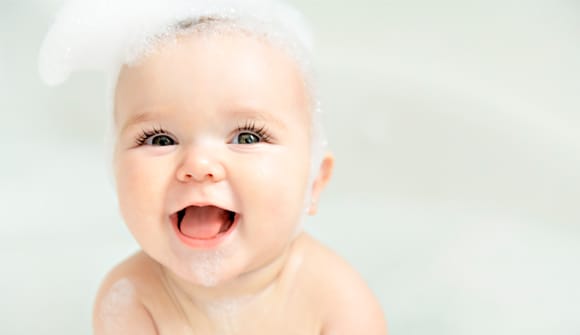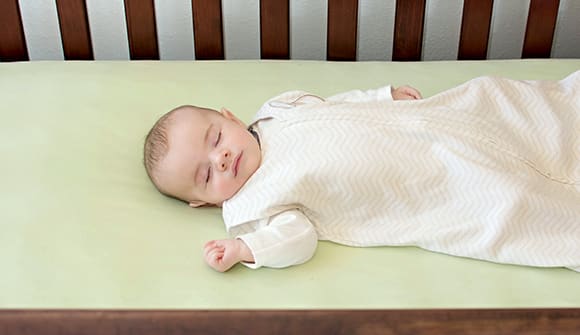Bathing your baby
Tips for treating and preventing eczema in little ones.
Article Author: Katie McPherson
Article Date:

Wondering if you should pop your baby in the bathtub after dinner, or try to clean him or her up with a few wipes and call it a night? New research finds bathing babies more than once a week nearly doubles their risk of eczema, which can even lead to a weakened skin barrier and a higher risk of infections over time.
Eczema is a condition that causes the skin to itch, producing a red, inflamed rash. Skin that has been irritated by too many baths can have similar symptoms to eczema, like itchiness or dryness, but the tell-tale sign of eczema is circular, red, scaly patches that pop up on your little one’s body.
Choosing a bathing routine
Rustin Buffington, MD, is a board-certified pediatrician at Baptist Medical Center South and Wolfson Children’s Hospital. He said deciding how often to bathe your baby should be based on his or her age. He adds choosing the right products, and using them frequently, is key in keeping baby’s skin healthy and delightfully soft.
“In the first year of life while the infant is not that mobile, bathing one to two times per week is sufficient. Once the child becomes more mobile and at greater risk of skin contamination, it becomes a balancing act of making sure the skin is clean while trying not to dry it out by bathing too often. Most pediatricians still recommend bathing toddlers and older children every one to two days, even if eczema is present.”
Some parents choose to postpone bathing for a few days after birth. Dr. Buffington explained vernix, the “cheesy” white material left on babies’ skin right after birth, is a protective layer to keep baby warm inside the womb and reduce the chance of infection. That’s why some families opt not to wash their newborn for as long as possible, but it's not always the pediatrician-recommended choice.
“If there are any maternal infections, there is a chance bacteria could be colonizing on the skin of the infant,” he said. “In those situations, it is important to cleanse the skin shortly after birth. Generally, it’s recommended that baths be delayed after birth for up to 24 hours, but there’s no scientific data to support delaying past 24 hours.”
When deciding whether your baby needs a bath, it’s not just about whether he or she has already had one this week.
“It’s not the bath specifically that causes problems, rather it’s the soap and drying technique that lead to skin irritation. It is important to make sure baths only last five to 10 minutes so the skin doesn’t start to prune, and to use a patting technique to dry the skin rather than a rubbing motion,” Dr. Buffington said.
Skincare selections
The key to keeping your baby’s skin healthy is to moisturize, moisturize, moisturize. This helps the skin stay hydrated and protect itself from irritation or infection.
“Moisturizing the skin is a critical part of eczema control, so it’s important to do so after every bath. For best results, apply lotion at least twice daily to reduce flares or severe episodes of eczema. Having a son with eczema, I can tell you the extra time it takes to apply moisturizer twice daily is well worth it compared to the poor night’s sleep that comes with irritation and scratching,” said Dr. Buffington.
If your baby is eczema-prone or experiencing eczema right now, it’s best to steer clear of scented products that might further irritate his or her skin.
“Fragrances contain chemicals, even if they are all-natural, so they run the risk of irritating the skin. Because of this, I recommend staying away from all scented products. The best bet is to use a petroleum-based product so the skin does not absorb any chemicals and become irritated. Vaseline, Aquaphor and Eucerin are all good choices to help seal the skin to lock in the moisture. Water-based products like lotion are fine, but only provide a temporary seal to the skin. In fact, most water-based products can actually cause a burning sensation when applied to irritated skin.”
Try as you might…
Babies can experience eczema no matter how hard you try to prevent it. Dr. Buffington adds that some babies are at a higher risk of eczema regardless of how careful parents are about their bathing routine.
“Eczema arises due to a lack of moisture in the skin. Some children are born with less filaggrin, a special protein in the skin that helps retain moisture and protect the skin from the environment. This places them at a higher risk of developing eczema, though the condition is still impacted by both genetic and environmental factors.”
Whatever the cause, if your baby is in a flare, Dr. Buffington recommends treating the eczema patches with an over-the-counter 1% hydrocortisone ointment (not cream) once or twice daily, with a moisturizer applied over top. This should calm the skin in just a few days.
“Most of all, talk to your pediatrician about eczema control and treatment,” said Dr. Buffington. “This is one of the most common conversations we have, second only to those about bowel movements. Using social media and Google can lead you down the wrong path and get you to buy products you don’t need and that may not help.”
Baptist Primary Care is home to a number of expert pediatricians who can see your baby for any concerns, as well as routine visits and vaccinations. Request an appointment online for help finding the best doctor for your little one.
Reference: Eczema research study



